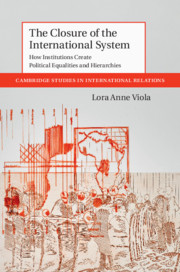 The Closure of the International System
The Closure of the International System Book contents
- The Closure of the International System
- Cambridge Studies in International Relations: 153
- The Closure of the International System
- Copyright page
- Dedication
- Contents
- Acknowledgments
- 1 False Promises of Universalism
- 2 The Closure Thesis
- 3 “The Master Institution”
- 4 “Dwarves and Giants”
- 5 “In Larger Freedom”
- 6 What Remains of the Promise of Equality?
- References
- Index
- Cambridge Studies in International Relations
5 - “In Larger Freedom”
International Organizations between Sovereign Equality and Inequality
Published online by Cambridge University Press: 16 June 2020
- The Closure of the International System
- Cambridge Studies in International Relations: 153
- The Closure of the International System
- Copyright page
- Dedication
- Contents
- Acknowledgments
- 1 False Promises of Universalism
- 2 The Closure Thesis
- 3 “The Master Institution”
- 4 “Dwarves and Giants”
- 5 “In Larger Freedom”
- 6 What Remains of the Promise of Equality?
- References
- Index
- Cambridge Studies in International Relations
Summary
This chapter asks how do international institutions adjust to changes in the number, diversity, and relative power of system members? It combines the Weberian concept of social closure and the idea of club goods to argue that, as IOs come under pressure to open up to new and more heterogenous members, the logic of closure creates incentives for incumbent members to create institutional designs that preserve their privileges. In the face of membership diversity, rules that promote procedural equality—i.e., consensus and majority voting rules—challenge status quo interests. In response, incumbents pursue designs that preserve clubs of like-minded actors through assimilative, hierarchical or exclusive multilateralism. The chapter discusses how self-determination, the principled basis for membership expansion, serves as a rule of closure. Then it considers the cases of the United Nations at its founding, the United Nations during its main period of expansion under demands for a New International Economic Order, and the G20, which many have pointed to as a new model of inclusive governance. Each case shows how expanding institutional membership may improve formal equality while triggering a decrease in procedural equality, creating institutional arrangements in which all are equal, but some are more equal than others.
Keywords
- Type
- Chapter
- Information
- The Closure of the International SystemHow Institutions Create Political Equalities and Hierarchies, pp. 163 - 219Publisher: Cambridge University PressPrint publication year: 2020
